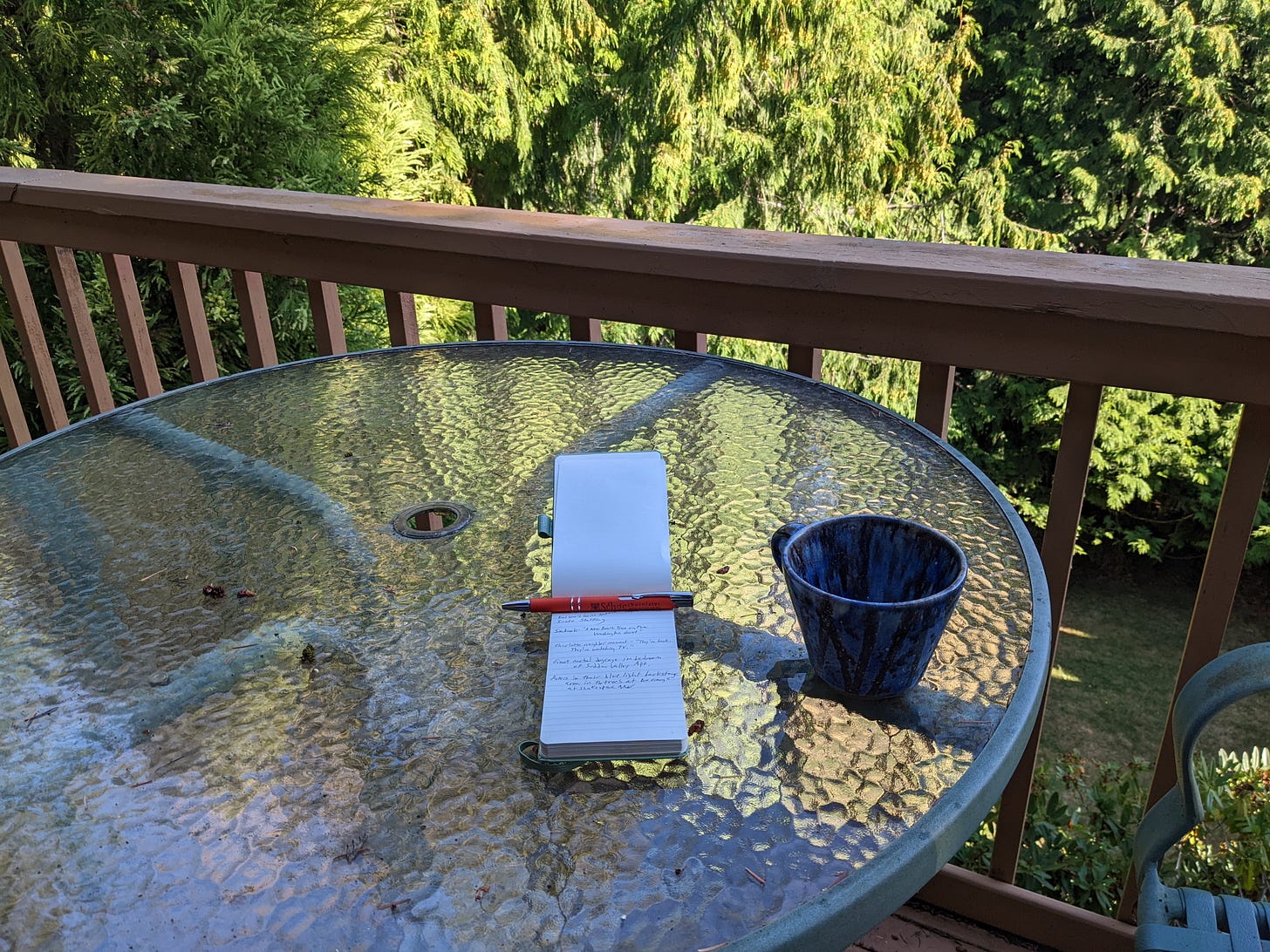Maxim Monday, #2: Old Frenemies Showing and Telling Meet Their Maker, Face the Future
Glen battles the blather. Then offers some.
I’m going to leave the intro from MM #1 pinned here for new readers. For today’s new post, scroll down below the photo:
By way of user’s guide, I’m reprinting a snippet from a post I put up this past spring about teaching writing:
“All those rules we’ve all read...any maxims we’ve stuck to our workspaces or screened on our mugs or chanted like prayers...they’re exactly as good as the last thing they helped you get done. Many of them are brilliant. A few of them are true. All of them are wrong.”
Which is just to say, take these for what they are: encouragement; company; one long-timer’s half-sketched map to his own Writer Island, where he takes the air and scours the woods and abandoned buildings and works the days away and may or may not discover buried treasure and may or may not recognize it if and when he does. Hope they help you find yours.
(Also just to say that I’ve eaten all the words left in the refrigerator. Delicious, of course, so sweet and so cold. But every time I open that door, there seem to be more in there, so you should go and check…)
Sometimes I’ll be taking on or adding to or denying longstanding writing truisms. Sometimes I’ll be offering my own.
Hope at least a few of these, over the course of the year, inspire or prod or spur or enrage you enough to get you back out there and digging. If you have thoughts, share ‘em!
And if you do find inspiration here, and you want to show appreciation, please share that somewhere, too. Or click this little purple button, if you’re so inclined…
Maxim Monday #2:
“Show, don’t tell.”
I had developed—and still employ— a whole riff and set of exercises and line of thought about this one. About how to extract the undeniably useful juice from such a tired phrase, flavor with some contrarian zest, discard the bitter (and misleading, and frankly ridiculous) rind.
I’ll get to some of that, and share some suggestions for how to do it, in tomorrow’s Technique Tuesday. But…
Is this concept even taught anymore? Do the people who teach it still believe it or imagine it useful? Because the truth is, one whole realm of contemporary literary and general fictional thought— the one very much in ascendancy—centers on discarding both, replacing showing and telling with musing. Fiction as a sort of personality-analysis Pilates in which human reaction to experience is stripped of outdated notions such as “meaning” or “compassion” or even “outrage” in favor of varieties of detached, narcissistic self-loathing. A literature aspiring to icy, granular remove as a means to…bravely discovering and declaring that people often suck? Reaffirming through recognition the suckiest bits of ourselves? Thereby granting permission to keep sucking?
That said, I’m neither entitled nor want to be get-off-my-lawn man, and I am not waving a flag for the traditional. I’m not any kid of -ist except a good writing-ist. As always, Sturgeon’s Law— one of the most durable maxims about writing (or living) that anyone has ever generated— still applies. Some of my favorite work of the last few years definitely could be dropped into the frame I outlined above. I myself, for better or worse, am often in part a muser (or, hopefully, a-musing?).
But if you’re concocting fiction that still uses scenes, or any kind of narrative thread— and even if you’re not, because even Personality-Analysis Pilates relies on connecting threads and memorable phrases— here’s a way of thinking about showing and telling that I have found truer, more flexible, and more helpful as a writing guide for myself and for students:
It’s not a question of showing versus telling. It’s a question of when. You need both.
Yes, absolutely, when you hit moments that matter, you want to lure readers into the pool, not offer them vacation photos. So that’s when you show. I guess I am a traditionalist in this specific way: I don’t want my art only to make me think; I also want it to help me feel.
But in-between those moments, you also need the glide. The kind of efficient, graceful narration that generates, sustains, and builds momentum, fascination, interest. I take back what I said about wanting to lure readers into your pool; you want to pick them up and hurl them. Telling well is how you generate the force to do that.
There’s a reason they don’t call this whole endeavor storyshowing.




So glad it's useful, Bob. And wonderful to see you here.
I needed this perspective on show and tell. Even though I don't teach or write fiction, I will try to adopt this angle in my approach. Thanks to Glen